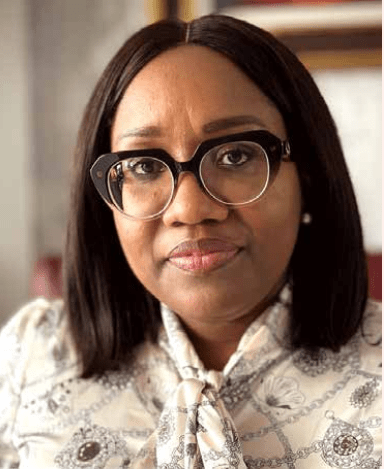Place your adverts here on InfoDig @ low rates; banner ads, sponsored links and guest articles etc. Contact us

Pharm. (Mrs) Ifesinachi Anyamene
Pharm. (Mrs) Ifesinachi Anyamene is the founder and director of Fieldway Pharmacy, Croydon, United Kingdom. A highly respected independent pharmacist prescriber, she earned her qualifications from Robert Gordon University in Scotland and recently achieved certification as a designated prescribing practitioner (DPP). Born in London and raised in Nigeria, Anyamene’s upbringing was steeped in academia, with her parents playing key roles in education. Her dedication to community pharmacy in the UK has garnered her numerous accolades, including the 2022 Prince Charles 100 Frontline Pharmacists Award, recognition in the Royal Pharmaceutical Society’s Stars for Black History Month, a spot on The Pharmaceutical Journal’s prestigious ‘2023 Women to Watch’ list, and a Fellowship of the Royal Pharmaceutical Society.
In this special Diaspora edition, Anyamene speaks with Temitope Obayendo about her inspiring journey as a woman from a Black, Asian, and Minority Ethnic (BAME) background who defied the odds to establish her own pharmacy. She shares how determination, coupled with a patient-centred approach to pharmaceutical care, helped her overcome numerous challenges. Anyamene offers valuable advice for Nigerian pharmacists aspiring to follow in her footsteps, emphasising the importance of leveraging their education and experience. She also provides insight into the evolving landscape of pharmacy practice in the UK. Read on for her compelling story.
Tell us about yourself, your family background, and your educational qualifications.
I was born in London, England, but my formative years were spent in Nigeria, where my upbringing was deeply influenced by academia. My father, a university professor, taught at the University of Nigeria, Nsukka, while my mother was a primary school teacher at the university’s primary school. This early exposure to education instilled in me a profound respect for learning and community service.
After attending the prestigious Federal Government College in Enugu, Nigeria, I pursued my passion for pharmacy at the University of Nigeria Pharmacy School. Following my National Youth Service Corps (NYSC) programme in Nigeria, I decided to launch my career in the UK, where I now live with my supportive husband and our children.
In the UK, I’ve established myself as a respected pharmacy contractor, as well as an independent prescriber, having earned my qualifications from Robert Gordon University in Scotland. Recently, I also achieved certification as a designated prescribing practitioner (DPP) in pharmacy, expanding my capability to deliver comprehensive care to my patients and other healthcare providers.
My diverse background has not only shaped my career but also fuels my dedication to making a meaningful impact in healthcare. I am deeply committed to improving patient outcomes and addressing healthcare disparities through innovative pharmacy practices. It is a privilege to contribute to both the Nigerian and British communities, which have profoundly influenced my personal and professional journey.
I am also a pioneer leader among African Independent Pharmacy Contractors, advocating for excellence and innovation in pharmacy practice. My goal is to continue pushing boundaries, enhancing patient care, and inspiring future generations of pharmacists to make a difference.
What informed your choice of Pharmacy as a course? Why not Medicine?
My decision to pursue Pharmacy as a career was shaped by several factors. While I have a deep respect for and interest in the medical field, I discovered early on that my strengths and passion lie in direct patient interaction and communication. Pharmacy offered me the opportunity to engage closely with patients, providing vital healthcare advice and ensuring medication safety and efficacy.
Unlike Medicine, Pharmacy allowed me to contribute to patient care without directly engaging in medical procedures. The role of a pharmacist is crucial in managing medications, providing healthcare advice, and collaborating with other healthcare professionals to optimise treatment outcomes. With the NHS’s Pharmacy First service, pharmacists now have the opportunity to prescribe treatments for minor ailments, further expanding our role in patient care.
My career choice reflects not only my academic strengths but also my commitment to delivering compassionate and effective healthcare services within the community. It is immensely fulfilling to play a pivotal role in patient well-being and contribute positively to healthcare outcomes through pharmacy practice.
You cut your teeth in Pharmacy before you left the shores of Nigeria. Can you share your work experience before leaving the country?
Indeed, my journey in Pharmacy began in Nigeria, where I gained invaluable experience that laid the foundation for my career. Following my university education, I completed my internship at the National Orthopaedic Hospital, Igbobi, where I immersed myself in the complexities of pharmaceutical care in a hospital setting. Subsequently, during my National Youth Service at Trinity Chemist, I discovered my passion for community pharmacy.
Before establishing your pharmacy, it’s certain you worked with other pharmacies. What gaps did you identify that led to the founding of your own pharmacy?
Before establishing my own pharmacy, I gained valuable insights while working as a locum/relief pharmacist in various settings within the healthcare field. Throughout my career, I identified several critical gaps that inspired me to embark on the journey of founding my own pharmacy.
Firstly, my unwavering dedication to patient care drove me to seek a more personalised approach to healthcare delivery. I wanted to create a more patient-centred approach where patients feel truly cared for and supported, beyond just dispensing medications.
Secondly, I observed the immense value of collaboration with other healthcare professionals. Establishing strong networks and partnerships is essential for holistic patient care, and I saw an opportunity to enhance these connections in my own practice. Additionally, I noticed the frustration caused by long queues and the limited advanced services available in the community. I envisioned a pharmacy that could offer efficient service with a wide range of specialised healthcare services, meeting the diverse needs of our community effectively.
Lastly, recognising the challenges faced by residents in our area, I was driven to establish a pharmacy that serves as a beacon of health and support. I wanted to bridge the gap in healthcare access and ensure that everyone in our community has access to high-quality, comprehensive pharmacy services. These observations and aspirations propelled me to establish my own pharmacy, where I am dedicated to making a meaningful impact on the health and well-being of our community.
Undoubtedly, you must have encountered some challenges. Could you share them and how you overcame them?
As a Black female pharmacist who immigrated and trained in a foreign country, my journey to becoming a business owner has been uniquely challenging yet deeply rewarding. Balancing the demands of launching and running a pharmacy business while managing personal and family responsibilities has been a constant juggling act. The initial navigation of a new healthcare system, coupled with the complexities of overcoming biases and stereotypes associated with being a woman and a person of colour, added significant layers of difficulty.
Accessing capital and resources to start my business was another hurdle, compounded by the realisation that, as a woman from a BAME (Black, Asian and Minority Ethnic) background, I often had to work twice as hard to prove my capability in a field where representation is lacking. Despite these obstacles, my unwavering determination to create a business that not only serves my community but also supports my family has been a powerful motivator.
Every challenge I’ve faced has strengthened my resolve and deepened my commitment to providing exceptional healthcare services. I am proud to contribute positively to the healthcare landscape and to inspire other women and individuals from diverse backgrounds to pursue their entrepreneurial dreams despite the odds.
With the japa syndrome on the rise, how would you advise aspiring young Nigerian pharmacists who want to migrate to the UK?
Firstly, I empathise with the aspirations of young Nigerian pharmacists seeking opportunities abroad, including in the UK. It’s crucial to approach this journey with thorough research and preparation. Understand the regulatory requirements and licensure processes specific to practising pharmacy in the UK, which differ significantly from those in Nigeria.
Secondly, leverage your education and experience gained in Nigeria as valuable assets. Many skills and insights acquired in Nigerian healthcare settings are transferable and highly respected internationally. Highlighting these strengths can enhance your competitiveness and appeal to prospective employers or regulatory bodies.
Additionally, seek mentorship and guidance from experienced professionals who have navigated similar paths. Networking within the Nigerian diaspora community and professional associations in the UK can provide invaluable support and insights into career opportunities and professional development.
Lastly, remain resilient and adaptable. Relocating to a new country involves adjusting to cultural, professional, and regulatory differences. Embrace continuous learning and professional growth opportunities to stay abreast of advancements in pharmacy practice and healthcare delivery.
Ultimately, pursuing your career aspirations abroad can be a rewarding journey, but it requires careful planning, determination, and a commitment to upholding the highest standards of pharmacy practice wherever you go.
How would you compare retail pharmacy in Nigeria to what operates in the UK?
Retail pharmacy in Nigeria and the UK differs significantly in terms of regulation, accessibility, services offered, and the overall healthcare environment.
In the UK, retail pharmacies are highly regulated by organisations like the General Pharmaceutical Council (GPhC) and must adhere to strict standards regarding the sale of medications, patient safety, and professional conduct. Pharmacists are required to have extensive training and qualifications. In Nigeria, while there are regulatory bodies like the Pharmacy Council of Nigeria (PCN) that oversee the practice, enforcement of regulations can be inconsistent. Unlicensed drug shops, known as “patent medicine chemists,” are common, and they sometimes sell prescription medications without proper oversight.
In the UK, the environment within retail pharmacies is highly standardised, focusing on patient privacy and safety. Pharmacies are often equipped with consultation rooms where patients can speak privately with the pharmacist. In Nigeria, the retail pharmacy environment can vary widely. In some places, pharmacies operate more like general stores, with medications displayed openly and little privacy for consultations. However, I am aware that there are more modern pharmacies in urban areas that are adopting international standards, with better facilities and private consultation areas.
In the UK, retail pharmacies are an integral part of the healthcare system, working closely with doctors and other healthcare professionals to ensure continuity of care. They are involved in national public health initiatives and play a key role in preventive health. Whereas in Nigeria, while pharmacies are crucial for providing access to medications, their role in the broader healthcare system is less formalised. Collaboration with other healthcare providers is less structured, and public health initiatives are less commonly run through pharmacies.
Overall, while both countries recognise the importance of retail pharmacies in healthcare, the systems in place, the services offered, and the level of regulation and accessibility differ significantly between Nigeria and the UK.
What would you describe as your most fulfilling moment in practice?
The most fulfilling part of being a pharmacist is helping patients improve their health and well-being by providing them with the right medications and personalised advice. Building trusting relationships with patients and being a reliable source of support during their health journeys is incredibly rewarding. Additionally, the opportunity to make a positive impact on the community through health education and preventive care is deeply satisfying.
This year, I felt particularly fulfilled as three young ladies of African descent, whom I had the opportunity to mentor since they finished secondary school, graduated from university this summer. I was especially proud that two of them graduated from pharmacy.

 3 hours ago
28
3 hours ago
28















 English (US) ·
English (US) ·